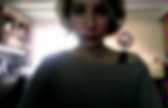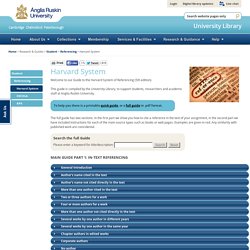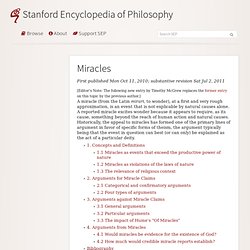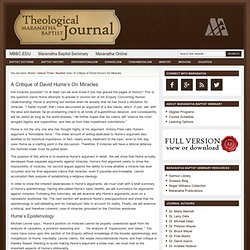

Anglia Ruskin University Library - Harvard System. Any in-text reference should include the authorship and the year of the work.

Depending on the nature of the sentence/paragraph that is being written, references to sources may be cited in the text as described below: Additional support on how to introduce such references is available from Student Support in their guide. When making reference to an author's whole work in your text, it is sufficient to give the name followed by the year of publication of their work: When writing for a professional publication, it is good practice to make reference to other relevant published work. This view has been supported by Cormack (1994). However, where you are mentioning a particular part of the work, and making direct or indirect reference to this, a page reference should be included: Cormack (1994, pp.32-33) states that "when writing for a professional readership, writers invariably make reference to already published works".
For more examples, see page numbers section. Directly using an and or Example: Hdo-1026.pdf. University of Glasgow Moodle2: Login to the site. Fogelin-v16n1. Miracles. First published Mon Oct 11, 2010; substantive revision Sat Jul 2, 2011 [Editor's Note: The following new entry by Timothy McGrew replaces the former entry on this topic by the previous author.]

A miracle (from the Latin mirari, to wonder), at a first and very rough approximation, is an event that is not explicable by natural causes alone. A reported miracle excites wonder because it appears to require, as its cause, something beyond the reach of human action and natural causes. Historically, the appeal to miracles has formed one of the primary lines of argument in favor of specific forms of theism, the argument typically being that the event in question can best (or can only) be explained as the act of a particular deity. 1. The philosophical discussion of miracles has focused principally on the credibility of certain claims in the Jewish and Christian scriptures. 1.1 Miracles as events that exceed the productive power of nature 1.2 Miracles as violations of the laws of nature 2. Therefore, A Critique of David Hume’s On Miracles. Are miracles possible?

Or at least can we ever know if one has graced the pages of history? This is the question David Hume attempts to answer in section ten of his Enquiry Concerning Human Understanding. Hume is anything but humble when he asserts that he has found a refutation for miracles: “I flatter myself, that I have discovered an argument of a like nature, which, if just, will, with the wise and learned, be an everlasting check to all kinds of superstitious delusion, and consequently, will be useful as long as the world endures.”
He further hopes that his claims will “silence the most arrogant bigotry and superstition, and free us from their impertinent solicitations.” Hume is not the only one who has thought highly of his argument. The purpose of this article is to examine Hume’s argument in detail. In order to show the inherent weaknesses in Hume’s arguments, we must start with a brief summary of Hume’s epistemology. Hume’s Epistemology Atheist, Christian, Deist, Irreligion? A Critique of David Hume’s On Miracles. Shibboleth Authentication Request.